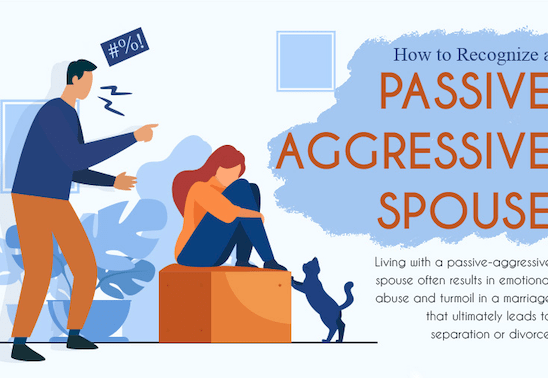Living with a passive-aggressive spouse often results in emotional abuse and turmoil in a marriage that ultimately leads to separation or divorce.
Recognizing Passive-Aggressive Behavior
Passive-aggressive behaviors often go undetected because the signs are difficult to recognize and may be interpreted as normal under certain conditions. In a marriage, a spouse who is subjected to passive-aggressive behaviors may suffer from emotional abuse caused by constant negativity, frustration, blame, and lack of empathy. Living with a passive-aggressive spouse can create ongoing family turmoil and conflicts that lead to consultation with a family law attorney.
(Article continues below infographic)
_________
The signs of spousal passive-aggressive behavior are hard to recognize because many abusers are good at manipulation. An emotional abuser is often skilled in hiding his or her feelings and twisting a situation to make the victim feel like the perpetrator. Signs of passive-aggressiveness can be subtle, but there are warning signs that should raise red flags.
Negativity
Constant negativity is one sign of passive-aggressive behavior. Rather than taking responsibility, a passive-aggressive spouse may become argumentative and sullen, criticizing and blaming his or her partner for problems.
Ambiguity
Ambiguity is a way to gain control and shift the blame. Negotiating agreements on family matters such as finances, child care, household chores, and lifestyle arrangements are likely to cause turmoil that postpones negotiation. When agreements are reached, they are likely to be breached.
Denial
Many passive-aggressive spouses are in denial about their behavior, so they blame other people for related problems that arise. Refusing to take responsibility for their actions only heightens denial and excuses behaviors leading to more blame and distorted reality.
Anger
Passive-aggressive behaviors may be linked to a person’s childhood and interactions with parents and other adults. Never expressing anger openly may be the result of punishment in younger years. A passive-aggressive spouse may feel anger but rarely express it openly. Instead, feelings of anger are shifted to putting blame on the other spouse or family members.
Procrastination
Passive-aggressive behavior often leads to procrastination. It is a form of rebellion to avoid responsibilities and agreements. Procrastination often leads to problems with employment, finances, and family responsibilities as seen by family law attorneys.
Dependency
Living with a passive-aggressive spouse can be difficult due to indecisive, non-assertive, and dependent behaviors. As a means of control, a passive-aggressive spouse is likely to break commitments and avoid helpful conversations to resolve problems.

